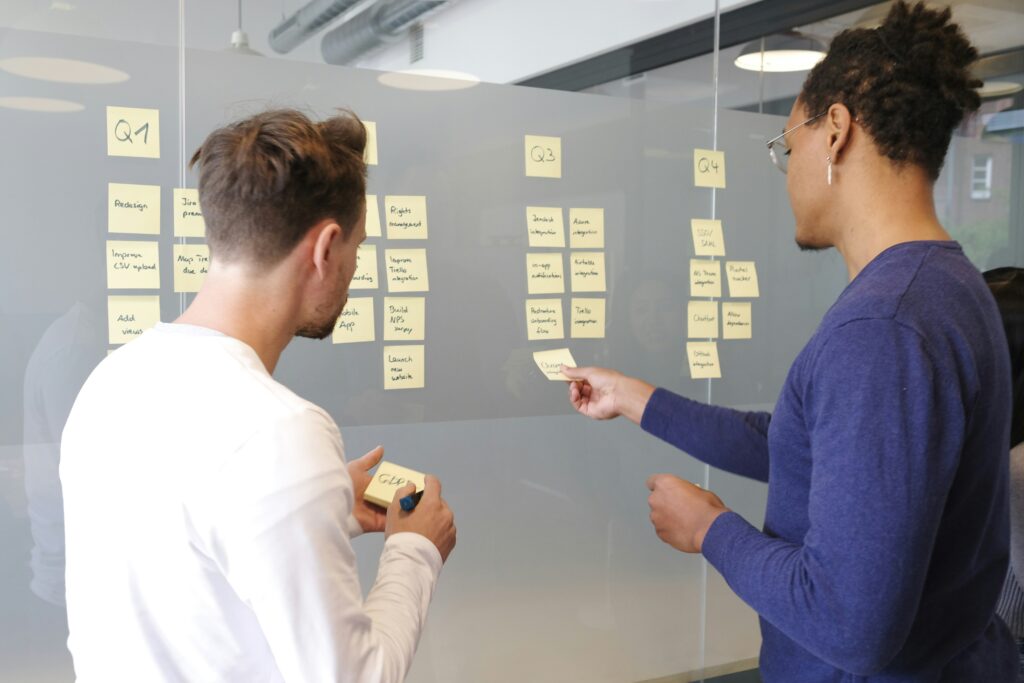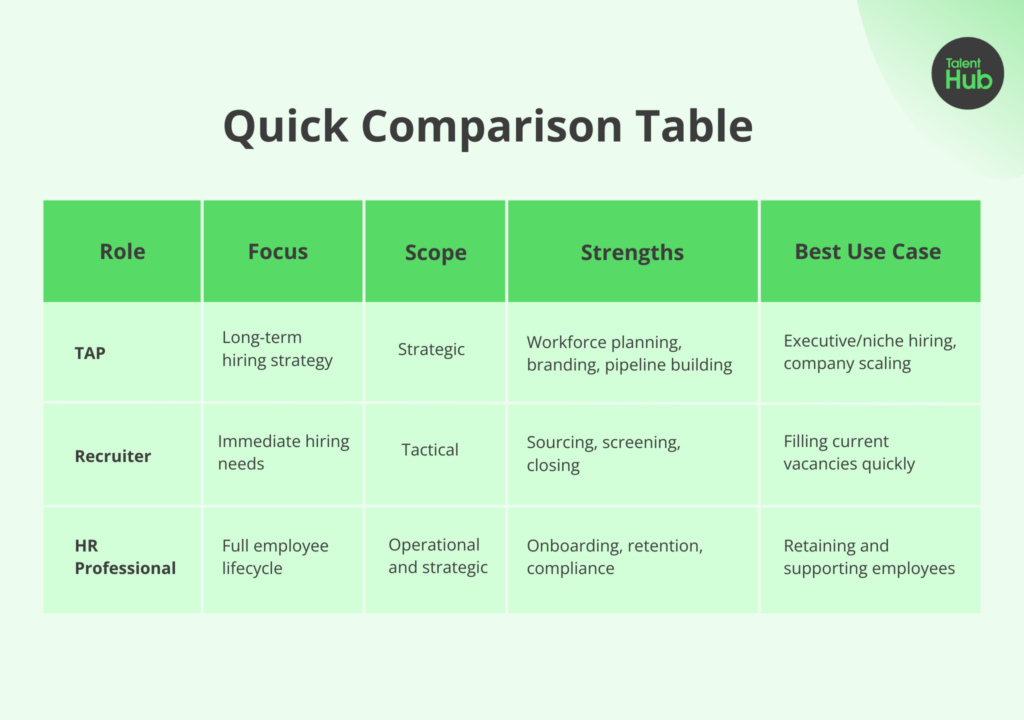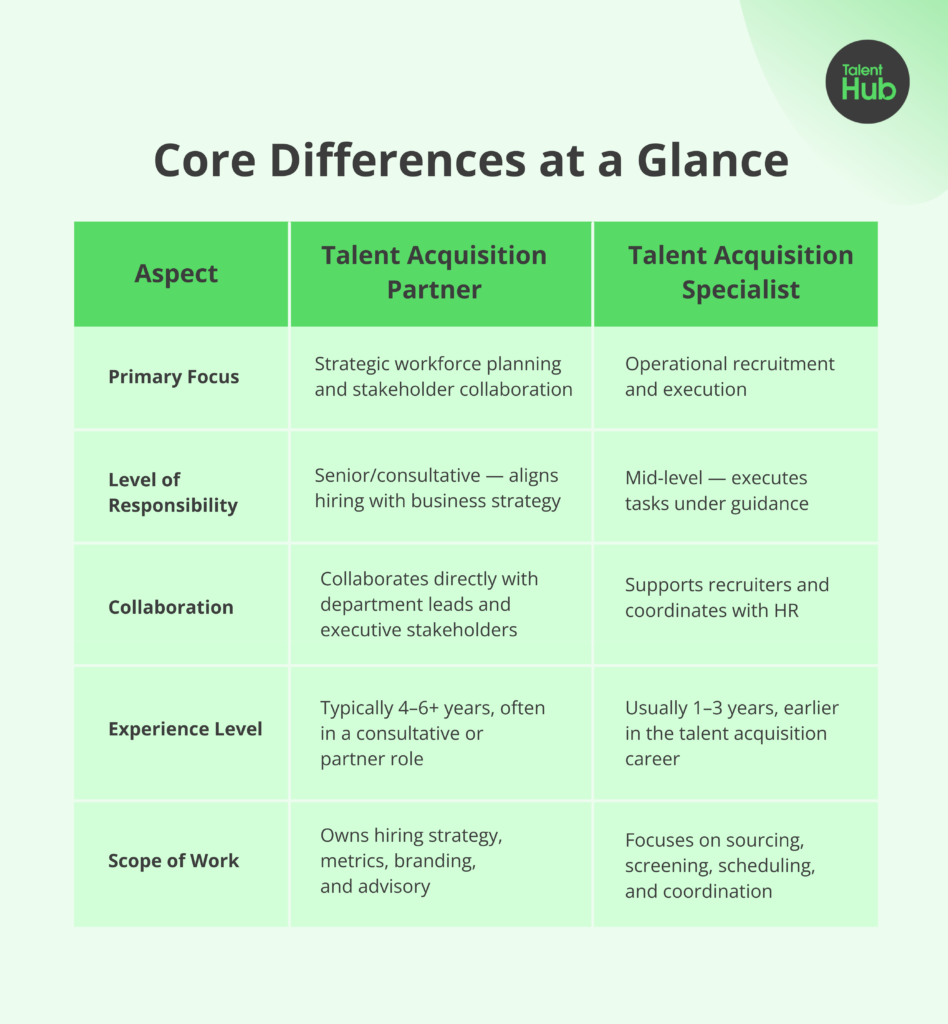As hiring needs evolve and competition for talent intensifies, companies are looking beyond traditional recruiters to find the right people for the right roles.
Enter the Talent Acquisition Partner (or TAP for short) — a strategic player who does more than fill jobs. TAPs are embedded within a business, helping shape long-term hiring strategies, guide workforce planning, and strengthen employer branding.
Whether you are scaling fast, hiring for niche roles, or simply want to elevate your recruitment process, understanding the TAP role could be the key to building a stronger, smarter, and more resilient team.
Let’s dive in and learn more about TAPs.
What is a Talent Acquisition Partner?
Talent acquisition partners collaborate with organizations to source and engage high-quality candidates, playing a key role in building a strong, diverse workforce by connecting the right talent to the right roles.
Unlike traditional recruiters who focus on filling immediate vacancies, talent acquisition partners operate as consultants within the organization, often embedded in HR or people operations teams. Their primary mission is to proactively identify, attract, and nurture top-tier talent that supports sustained organizational growth.
TAPs act as the main liaison between hiring managers and candidates, overseeing the entire talent acquisition lifecycle — from sourcing and screening to strategic planning, workforce forecasting, and employer branding. This role emphasizes not just hiring speed, but also hiring quality, culture alignment, and retention.
Companies typically engage talent acquisition partners when they:
- Anticipate rapid growth or expansion
- Need to build talent pipelines for hard-to-fill or niche roles
- Want to enhance employer branding and candidate experience
- Aim to implement data-driven, inclusive, and scalable hiring processes
While the title may vary, the function remains consistent: Elevating recruitment from a tactical task to a strategic business lever.

What Does a Talent Acquisition Partner Do?
A Talent Acquisition Partner plays a critical role in helping companies build high-performing teams through proactive, strategic hiring.
Their job goes far beyond posting jobs or filling open positions. Instead, they operate as internal consultants, combining recruitment expertise with organizational knowledge to develop and execute hiring strategies that align with long-term business goals.
At its core, the TAP role is about creating a consistent, people-focused, and data-driven hiring process — one that ensures every candidate touchpoint reflects the company’s culture, values, and aspirations.
Here’s what a talent acquisition partner is typically responsible for:
1. Develop and Execute Hiring Strategies
TAPs collaborate closely with hiring managers and department leads to forecast workforce needs and craft recruitment plans tailored to each role.
These plans often include sourcing timelines, outreach strategies, and candidate pipeline targets. They also influence broader initiatives like succession planning and organizational design.
2. Source and Engage Top Talent
Rather than waiting for applications, TAPs proactively search for active and passive candidates through channels like LinkedIn, social platforms, referrals, and events.
They specialize in sourcing for niche or high-skill roles and often build long-term relationships with candidates, even when no immediate openings exist.
3. Own the Candidate Experience
From first contact to final offer, the TAP is the face of the organization for job seekers.
They provide regular updates, set clear expectations, deliver timely feedback, and ensure the process feels respectful and transparent. Great TAPs humanize the experience while representing the brand with professionalism and warmth.
4. Collaborate and Advise Internally
TAPs don’t just take hiring orders — they consult.
They are involved with crafting better job descriptions, structuring interviews around competency-based questions, and setting realistic expectations on timelines and candidate quality. They often coach newer managers or junior recruiters and help resolve friction in the hiring process.
5. Champion Employer Branding
TAPs influence employer brand perception by collaborating with marketing to ensure consistent messaging across candidate touchpoints.
They work with marketing and communications to develop consistent messaging across platforms, engage with talent communities, and promote the employee value proposition. Their efforts help elevate the brand—and attract higher-quality applicants.

A Talent Acquisition Partner Key Responsibilities
A Talent Acquisition Partner plays a strategic role in shaping how a company attracts, evaluates, and secures top talent.
Their responsibilities span the full hiring lifecycle and require close collaboration with internal stakeholders, candidates, and external partners. Here are the primary responsibilities commonly aligned with the role of a Talent Acquisition Partner:
- Recruitment Strategy Development: Design and implement hiring strategies that support long-term business goals and workforce planning needs.
- Partnering with Hiring Teams: Collaborate with department leaders to understand role requirements, define candidate profiles, and align on recruitment strategies.
- Proactive Candidate Sourcing: Use platforms like LinkedIn, job boards, and professional networks, as well as events and referrals, to identify top active and passive candidates.
- Applicant Screening and Evaluation: Review resumes, conduct phone screens, and assess candidates through interviews and assessments to ensure quality and fit.
- Full-Cycle Recruitment Management: Oversee every stage of the recruitment process to ensure a consistent, transparent, and efficient experience for all stakeholders.
- Employer Branding Leadership: Collaborate with marketing to promote the company’s values and culture through job posts, social media, and employer events.
- Pipeline Expansion Activities: Represent the company at job fairs, university events, and industry meetups to attract and engage emerging and diverse talent.
- Talent Pool Cultivation: Build and nurture relationships with potential candidates for future hiring needs, especially in specialized or hard-to-fill areas.
- Candidate Experience Management: Ensure clear communication, timely feedback, and a respectful, engaging process for all applicants from start to finish.
- Cross-Functional Alignment: Partner with HR and departmental leads to ensure recruitment aligns with company goals, DEI initiatives, and retention strategies.
- Data and Metrics Reporting: Track and analyze recruitment data, such as time-to-fill and offer acceptance rates, to evaluate performance and make improvements.
- ATS and Technology Utilization: Maintain and optimize Applicant Tracking Systems and other recruiting tools to streamline workflows and improve efficiency.
- Interview Training and Coaching: Provide hiring managers with guidance on interview techniques, legal compliance, and inclusive evaluation practices.
- Onboarding Contribution: Support early-stage onboarding efforts, including offer negotiation, pre-boarding communication, and initial new hire engagement.
- Market Research and Trend Monitoring: Stay informed about emerging hiring strategies, market movements, and recruitment best practices.
- External Partnership Management: Build strong relationships with external recruitment partners, universities, and professional organizations to expand sourcing channels.
How Talent Acquisition Partners Compare to Recruiters and HR Professionals
Understanding where a Talent Acquisition Partner fits within the broader hiring and HR landscape can help clarify their unique strategic value.
While TAPs share common goals with recruiters and HR professionals, their responsibilities, approach, and long-term focus set them apart in meaningful ways.
Here’s how each role contributes to the talent journey and when to leverage them:
Talent Acquisition Partner
They focus on proactive talent sourcing, long-term pipeline development, and enhancing the company’s reputation as an employer of choice.
By partnering closely with leadership and hiring managers, TAPs help shape recruitment processes that prioritize quality, alignment, and sustained growth.
Key Characteristics:
- Anticipates hiring needs, plans for future workforce demands, and builds long-term talent pipelines
- Focused on long-term hiring needs
- Owns employer branding, pipeline development, and candidate experience
- Consults hiring managers and influences process improvements
- Uses data and insights to guide hiring strategies.
Ideal When: You need a forward-looking hiring strategy, employer branding help, or are scaling into new markets and leadership roles.
Recruiter
A Recruiter is typically focused on the immediate need to fill positions.
Their role is more tactical — posting jobs, sourcing candidates, conducting interviews, and managing job offers. Recruiters may work internally (corporate) or externally (agency), often handling higher-volume requisitions with quick turnaround expectations.
Key Characteristics:
- Task-focused and reactive
- Prioritizes filling current job openings
- Strong at sourcing, screening, and moving candidates through the funnel
- May handle salary negotiation and onboarding support
- Often manages multiple areas simultaneously
Ideal When: You need to quickly fill high-volume or frequent roles, especially in operational or frontline areas.
Human Resources (HR)
HR professionals oversee the broader employee lifecycle — including compensation, benefits, compliance, onboarding, performance management, and internal policies.
While they often collaborate with TAPs or recruiters during hiring, their focus is mostly on post-hire retention, development, and organizational alignment.
Key Characteristics:
- Organizational and policy-focused
- Manages employee relations, training, compliance, and compensation
- Ensures alignment between business goals and workforce strategy
- Handles performance reviews, grievances, and exit interviews
- Works cross-functionally to support employee wellbeing
Ideal When: You need support scaling your workforce sustainably, managing compliance, or improving employee retention and engagement.
Quick Comparison Table

So, to summarize:
What is the difference between HR and a talent acquisition partner?
HR manages the entire employee lifecycle, while a talent acquisition partner focuses specifically on developing and executing long-term hiring strategies.

What is the difference between a TA partner and a TA specialist?
While the titles Talent Acquisition Partner and Talent Acquisition Specialist are often used interchangeably, especially across industries and company sizes, there are notable distinctions in scope, responsibilities, and strategic impact.
Understanding how these roles differ can help organizations align their hiring functions more effectively — and help professionals identify the right career path.

Talent Acquisition Partner: The Strategic Architect
A Talent Acquisition Partner plays a critical role in aligning hiring efforts with long-term business objectives.
Rather than simply filling roles, they focus on future workforce planning, partnering with leadership to strengthen the employer brand, enhance the candidate experience, and guide hiring strategies that support sustained growth. TAPs oversee recruitment from end to end, ensuring every step reflects strategic priorities.
Key Responsibilities:
- Develop long-term sourcing strategies and succession plans
- Partner with senior leaders to forecast workforce needs
- Lead employer branding, DEI initiatives, and talent analytics
- Influence recruitment processes and advise on best practices
- Own recruitment metrics and ensure alignment with KPIs
Talent Acquisition Specialist: The Tactical Executor
A Talent Acquisition Specialist focuses on the operational side of hiring.
They are hands-on in sourcing, screening, coordinating interviews, and managing candidate communications. While they may contribute to strategic ideas, their main role is to ensure the day-to-day flow of candidates through the hiring pipeline is smooth and efficient.
Key Responsibilities:
- Source candidates via job boards, social media, and referrals
- Screen resumes and conduct initial interviews
- Schedule interviews and maintain ATS records
- Coordinate with hiring managers on role-specific requirements
- Represent the company at job fairs or recruitment events
Strategic vs. Tactical Thinking
- TAPs are strategic thinkers — concerned with quality of hire, culture fit, brand reputation, and long-term talent ROI.
- Specialists are tactical executors — focused on immediate needs, process efficiency, and candidate coordination.
When to Hire Which Role
- Hire a Specialist when you need help executing sourcing and recruitment operations across multiple open roles, particularly at mid or junior levels.
- Hire a Partner when you want someone to guide long-term hiring strategy, build talent pipelines, and improve stakeholder collaboration.
Why Partnering with a Talent Acquisition Expert Could Be Your Competitive Edge
If you’re navigating growth, scaling into new markets, or struggling to find the right talent in a competitive landscape, partnering with a Talent Acquisition expert could be one of the most strategic moves your business makes.
Unlike traditional recruiters who focus on filling immediate openings, Talent Acquisition Partners work alongside your leadership team to align hiring with business goals, shape employer branding, and build talent pipelines that last.
Whether you tap into this expertise through a specialized agency or engage a dedicated consultant, the right partner brings not just candidates — but clarity, consistency, and strategic direction.
In a talent market where quality, culture fit, and speed all matter, having a seasoned TA partner in your corner could be the edge that sets your organization apart.
Choosing TalentHub As a Talent Acquisition Partner
TalentHub is a high-impact Talent Acquisition Partner that goes beyond transactional recruiting to offer strategic, consultative support.
Rather than focusing solely on filling vacancies, TalentHub partners with organizations to understand long-term hiring needs, proactively identify talent, and shape the recruitment process around business goals, achieving this with:
- Strategic Hiring Focus: Helps companies plan for future growth by identifying high-impact engineering and executive talent.
- Commitment to Quality: Prioritizes culture fit, long-term potential, and retention.
- Data-Driven Recruitment: Leverages AI-powered talent mapping and recruitment analytics to make smarter sourcing decisions.
- Consultative and Collaborative Approach: Acts as an embedded partner rather than an external vendor, helping refine job requirements, improve outreach strategies, and guide clients through every stage of the hiring lifecycle.
- Employer Branding and Culture Alignment: By aligning candidates with a company’s mission and values, supporting employer branding and candidate experience.
Whether you’re hiring for niche technical roles or executive leadership, TalentHub delivers the strategic expertise, industry insight, and tailored support that make it an ideal Talent Acquisition Partner.


